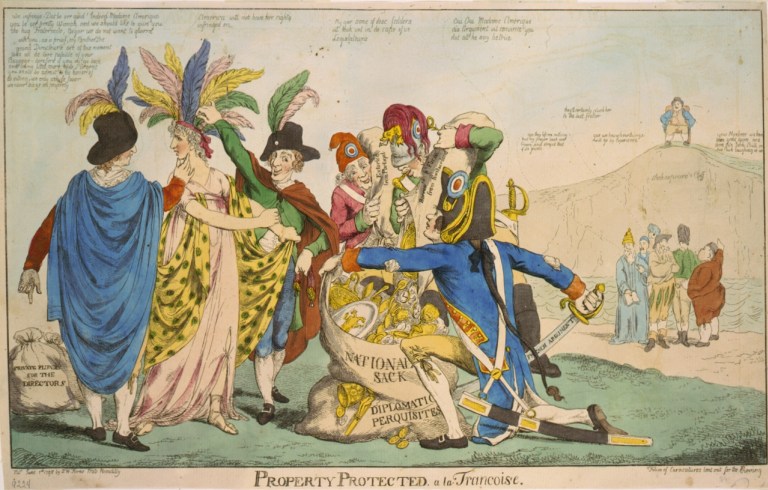The XYZ Affair was an incident that began an undeclared quasi-war with France. The name derives from the substitution of the letters X, Y, and Z for the names of French diplomats Hottinguer (X), Bellamy (Y), and Hauteval (Z) in documents released by President John Adams.

Jump to:
Post-Revolution Relations with France
During President George Washington’s time in office, he supported policies that favored Great Britain and would not involve the new nation in the French Revolution, despite some of his cabinet's wishes. He also traded with both countries, which angered the French, who believed America owed them.
The French had many leaders in America loyal to them due to their support in the American Revolution. However, Washington did not budge on his position and insisted that the nation stay out of entangling European politics.
During his second term in office, the Jay Treaty was ratified in Congress. The treaty did manage to calm British relations, but it had a negative reaction in France.
John Adams inherited a difficult situation.
Throughout his presidency, he stubbornly held to neutrality and did his best to keep the new country out of a war. This is despite men on both sides clamoring for him to pick aside.
The Federalists supported the Jay Treaty and Great Britain, while the Democratic-Republicans wanted to support France’s Revolution. However, Adams held his ground and continued to build up the military.
Commission To France
John Adams sent three commissioners to France:

- Charles Pinckney
- John Marshall
- Elbridge Gerry
When the commissioners arrived in France, they were to meet with the French minister Charles Maurice de Talleyrand.
However, Talleyrand delayed and said that he would only meet with the commissioners if they offered him a bribe and agreed to give France a low-interest loan.
These demands upset those in the United States and caused an uproar. Talleyrand had misjudged.
When Congress heard of these demands, they requested that President Adams release the documents as proof Talleyrand made such demands. Adams released them but redacted the names of the three intermediaries in case they would need to use them later. They were renamed X, Y, and Z.

United States Reaction
The reaction to Talleyrand’s demands was a loss of public support for France. This aided the Federalist cause, who favored England over France, and harmed Jefferson’s Republicans, who viewed the French Revolution as an extension of their own.
A 20,000-man army was raised, and the United States began to build their Navy in preparation for a war with France. Americans began attacking French privateers and trade vessels, which would become known as the Quasi-War.
Talleyrand quickly backtracked and opted to meet with the commissioners. He wanted to avoid a war that France could not afford.
The Treaty
By late 1800, the United States Navy and the Royal Navy, combined with a more conciliatory diplomatic stance by the government of First Consul Napoleon Bonaparte, had reduced the activity of the French privateers and warships.
The Convention of 1800, signed on September 30, ended the Quasi-War. It affirmed the rights of Americans as neutrals upon the sea and abrogated the alliance with France of 1778.
However, it failed to provide compensation for the $20,000,000 “French Spoliation Claims” of the United States. The agreement between the two nations implicitly ensured that the United States would remain neutral toward France in the wars of Napoleon and ended the “entangling” French alliance. This alliance had been viable only between 1778 and 1783.
Impact of the XYZ Affair
The XYZ Affair brought about some significant changes to the American military:
- After the American Revolution, the United States had sold off all its ships. They did not believe it was a function of the Federal Government to keep a standing Navy. After the Quasi-War with France, it seemed to be a necessity, and they began a plan to build a Navy.
- To support the standing Navy, Congress created the Marine Corps.
The XYZ affair also raised anti-French sentiment, which caused the passage of the Alien and Sedition Acts. This was one of the most unpopular pieces of legislation ever passed by Congress. It cost John Adams re-election and allowed Thomas Jefferson to paint him as a monarch.
States were also enraged over the acts because they saw it as a violation of state rights. Virginia and Kentucky even passed legislation condemning the acts and threatened to secede from the Union.
